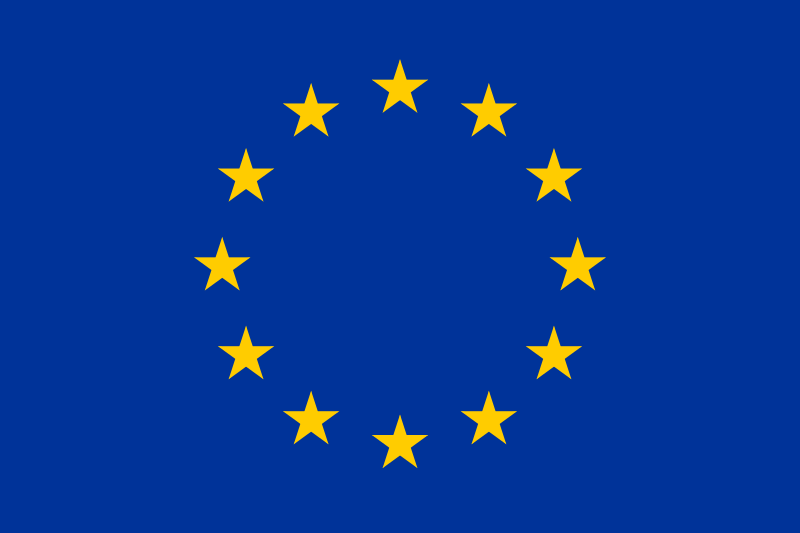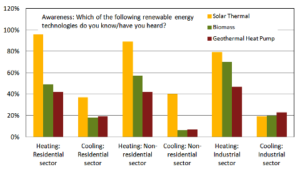Europe: Energy Security Strategy to Improve Relevance of Renewable Heating
June 3, 2014
The European Commission has now published its Communication on Energy Security, which proposes a set of immediate actions to address the current crisis, but mostly concentrates on other measures to be implemented in the longer term. The proposed actions include “an accelerated fuel switch in the heating sector to renewable heating technologies”. In a press release from 30 May 2014, ESTIF, AEBIOM, EGEC, the industry associations representing the solar thermal, biomass and geothermal sector, respectively, welcomed the priority given to renewable heating in the Commission’s Communication on Energy Security strategy.
Photo: ESTIF
According to the strategy paper, the European Union (EU) imports 53 % of the energy it consumes. Energy import dependency concerns crude oil (almost 90 %), natural gas (66 %), and, to a lesser degree, solid fuels (42 %), as well as nuclear fuel (40 %). The strategy highlights areas in which decisions need to be taken or concrete actions implemented in the short, medium and longer term to respond to energy security concerns. It is based on the following eight key pillars:
- Take immediate actions aimed at increasing the EU’s capacity to overcome a major disruption during the winter of 2014/2015.
- Strengthen emergency/solidarity mechanisms, including the coordination of risk assessments and contingency plans, and protect strategic infrastructure.
- Moderate energy demand.
- Build a well-functioning and fully integrated internal market.
- Increase energy production in the European Union.
- Further develop energy technologies.
- Diversify external supplies and related infrastructure.
- Improve coordination of national energy policies and speak with one voice when it comes to external energy policy.
With regard to item five of the list, the Commission plans to increase the use of renewable energies in the European Union to avoid fossil fuel imports. According to the strategy paper, energy from renewable sources was estimated to have contributed 14.1 % to the EU’s final energy consumption in 2012 and should reach the objective of 20 % in 2020. Beyond 2020, the Commission proposes to increase the share of renewable energy to at least 27 % by 2030.
Security of supply emergency mainly a heating crisis
“The current security of supply emergency is mainly a heating crisis,” Jean-Marc Jossart, Secretary General of the European Biomass Association, AEBIOM, stated in the above-mentioned press release. “The renewed concerns for our security of supply lie in the EU’s heavy dependency on energy imports, which are mostly used for heating purposes in the residential, service and industrial sector and which can be replaced with renewable sources,” he added.
“It is a very positive sign that the strategy highlights the need to increase energy production in the European Union, namely by using indigenous resources, such as renewable energy,” Pedro Dias, Secretary General of the European Solar Thermal Industry Federation, ESTIF, said. He added: “In particular, we welcome the European Commission’s proposal that Member States accelerate the fuel switch in the heating sector to renewable heating technologies as one of the key actions to be implemented.”
“We must remember that our societal challenges go beyond energy security. They include providing affordable heat and securing a sustainable future,” Philippe Dumas, Secretary General of the European Geothermal Energy Council (EGEC), said and added: “According to projections from the industry, the EU could reach a 25 % share of renewables in the heating and cooling sector by 2020. At current average import prices for natural gas, this would save the EU as much as EUR 21 billion annually!”
Industry associations publish position paper
ESTIF, AEBIOM and EGEC have recently published a position paper: “Renewables for heating and cooling and EU security of supply: Save over 20 billion euros annually in reduced fossil fuel imports” (see the attached document). The paper includes the associations’ following key messages:
- The current security of supply emergency is mainly a heating crisis: The renewed concerns for security of supply are mainly due to the EU’s heavy dependency on natural gas from Russia. Indeed, natural gas is mainly being used in the following sectors: 41 % for the heating of buildings, 31 % for industrial processes, and, only to a lesser extent, in power plants (~25 %).
- Renewables for heating and cooling must be a pillar of the EU’s energy security: Small- and large-scale geothermal, biomass, and solar thermal technologies will, alongside energy efficiency, alleviate fossil fuel dependency by quickly replacing natural gas in the residential and tertiary sector, as well as for industrial processes.
- Saving the EU up to EUR 21.2 billion annually in avoided gas imports: By achieving the targets for renewables in heating and cooling (21.4 % in 2020), the EU could reduce its gas imports by the equivalent of 28.7 Mtoe annually in 2020. With current average import prices, this would save the EU some EUR 9.6 billion. However, with more ambitious policies, it would be possible to cover 25 % of the total heat demand by the end of this decade. The annual savings in reduced fossil fuel imports would amount to as much as EUR 21.8 billion compared to 2012.
- Stable and long-term framework conditions called for: The industry is ready to deliver, but needs stable and long-term framework conditions. Adequate and dedicated roots to activate current and future funds are needed. In order to establish a level playing field, it is of the utmost importance to immediately phase out fossil fuel subsidies and to place a tax on carbon and other emissions in sectors not covered by the EU Emissions Trading System (in particular, for buildings).
More information:
ec.europa.eu/energy/security_of_supply_en.htm


